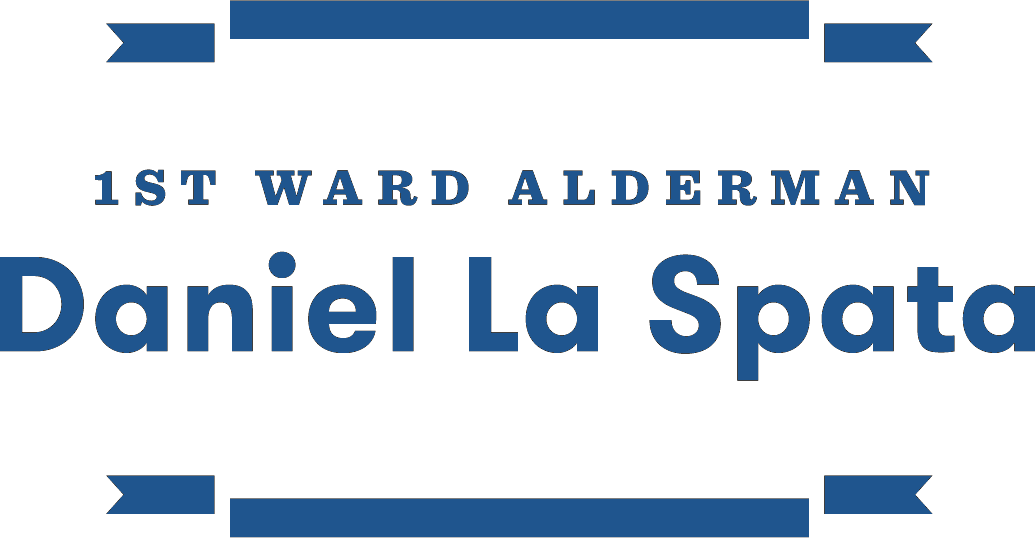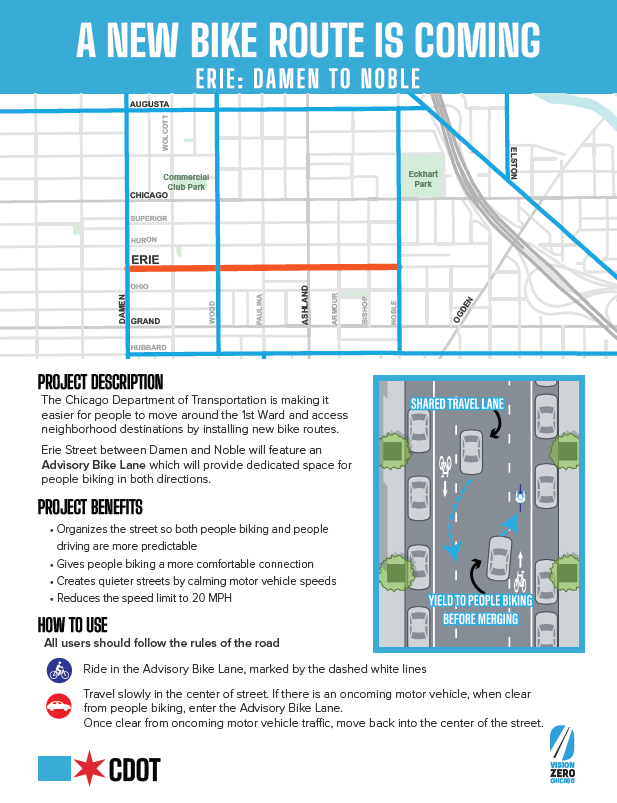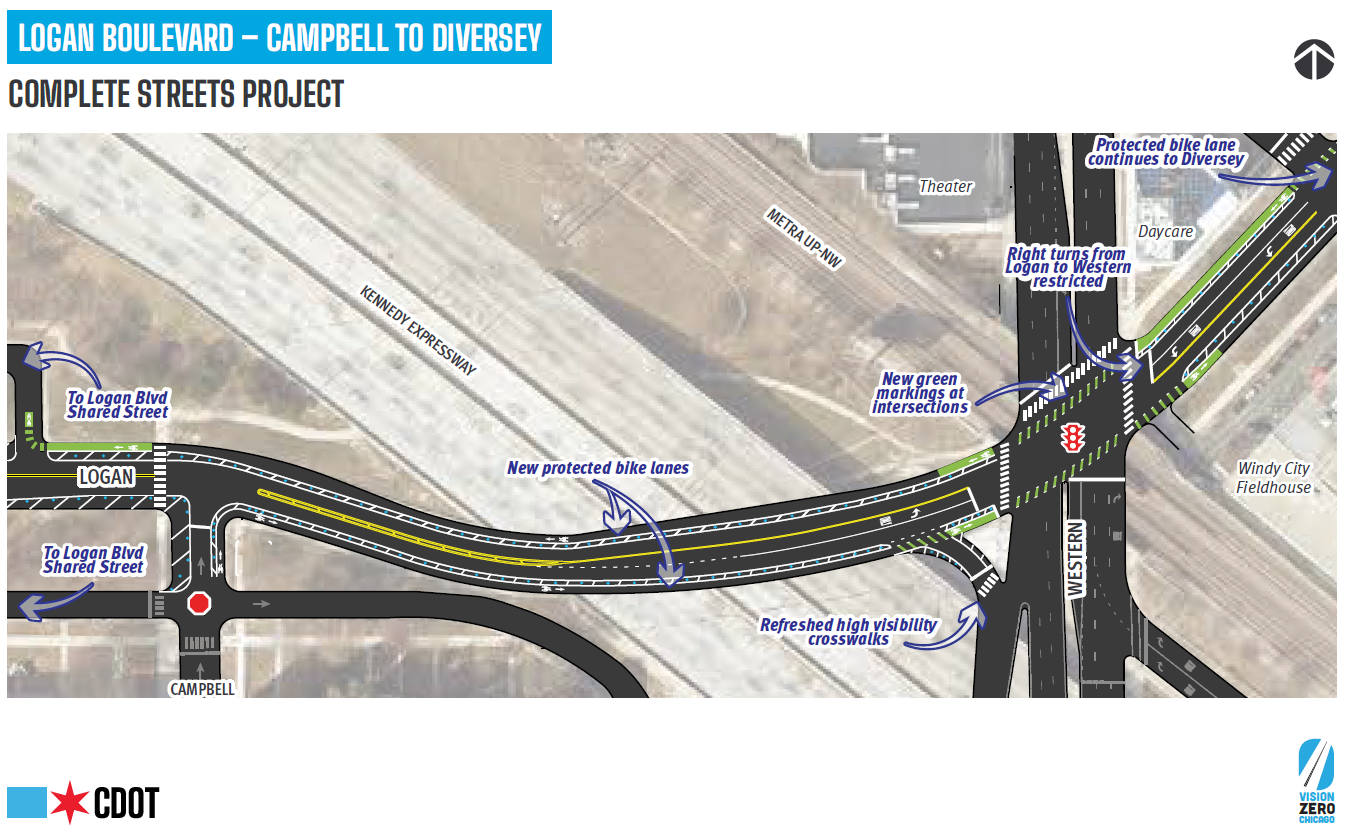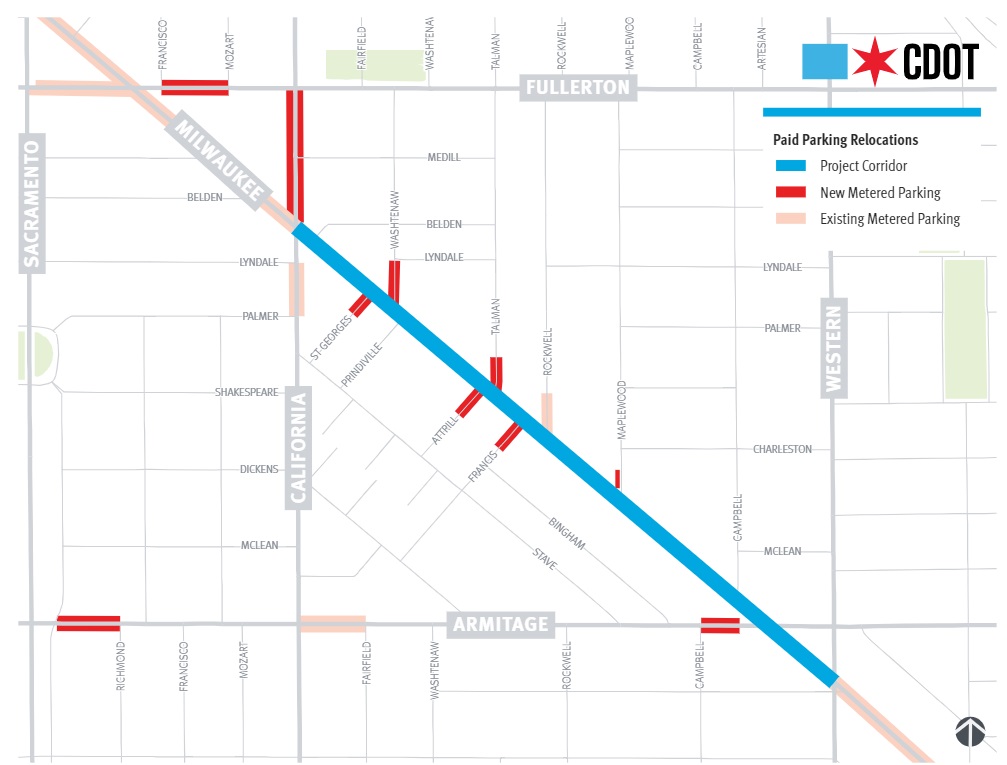Shared Cost Sidewalk Program 2024:
The City’s Shared Cost Sidewalk Program opens Monday, January 8, 2023, from 6am to 10pm. The Department of Transportation sent the 1st Ward Office a comprehensive FAQ, which you can read in its entirety on our website.
Participatory Budgeting 2023 - 2024
Each year, Participatory Budgeting has grown, in terms of volunteers, submissions from residents, and voting. This year, 1,202 1st Ward residents cast votes for Participatory Budgeting, to urge Alderman La Spata to allocate up to $1,000,000 in discretionary spending ("menu money"). What is Participatory Budgeting? You can learn more at the 1st Ward website.
The good news is that the estimated cost plus contingency for all projects totals around $970,000, which means that pending feasibility review from Chicago Public Schools, the Chicago Park District, and Chicago Department of Transportation, it is expected that each of these programs can be funded. In fact, to ensure quick implementation, the paving items have already been submitted to Chicago Department of Transportation for survey. The earlier ward offices submit projects for survey, the more likely it is that they are completed in a given construction season, so the 1st Ward Office has already submitted these priorities for review.
In order of preference, you voted for:
(1) Up to $175,000 for an intergovernmental transfer to upgrade Wicker Park Dog Friendly Area (1425 North Damen)
(2) Up to $100,000 for an intergovernmental transfer for a new Goethe Elementary School playspace and field (2236 North Rockwell)
(3) Up to $100,000 for an intergovernmental transfer to upgrade Park 399 (1420 North Artesian)
(4) Up to $120,000 to repave alleys behind 2232 North Western (Western / Campbell / Belden / Lyndale) and 1400 North Western (Western / Artesian / Hirsch / Le Moyne)
(5) Up to $115,000 to repave the south sidewalk on 1601 – 1699 West Superior
(6) Up to $240,000 to repave 1000 – 1199 North Marshfield and 1500 – 1599 North Bell
(7) Up to $120,000 to repave 800 – 999 North Marshfield
The 1st Ward Office is working on detailed graphics to demonstrate how residents specifically voted, which could be accomplished down to the block level in many cases. This is the first of several expected updates on Participatory Budgeting.
One of the benefits of this ballot system also included general infrastructure priorities. Since so many residents voted, this provides an excellent sample of people from across the ward, and 1st Ward Staff can use these priorities for the next year with Alderman La Spata to help balance priorities. For example, with the remaining $500,000 of discretionary infrastructure funds, the importance of street lighting, street resurfacing, and pedestrian bump-outs can be weighed against other infrastructure needs.
1st Ward resident priorities:
Bike lane development (496 votes)
Street resurfacing (474 votes)
Paving pedestrian bumpouts (456 votes)
Street Lighting (425 votes)
Alley resurfacing (364 votes)
Paving sidewalks (356 votes)
Paving speed humps & reducing speeds (225 votes)
Adding traffic signal improvements (225 votes)
ADA mobility improvements (189 votes)
Curb & Gutter and other paving improvements (163 votes)
The good news with these priorities is that Alderman La Spata just attended his annual infrastructure briefing, so we are all prepared to push these priorities with the Department of Transportation:
Alderman La Spata has requested data for which areas of the ward have the most concentrated need for street light improvements, and he has also requested allocations from Tax Increment Financing districts to improve street lighting in TIF districts. These projects are in the works.
The Department of Transportation provides a surveying tool that aggregates all pavement complaints made to the City, thereby grading streets on paving quality. 1st Ward Staff have been proactively surveying streets in the Ward to corroborate these data, and Alderman La Spata now has received maps that demonstrate where potential conflicts with other utility projects are. This will allow the worst quality streets in the Ward with no permitting conflicts to be sent to the Department, so they are hopefully paved in a speedy manner.
The 1st Ward Office is systemically running through speed hump requests on a first-come, first-served basis, and is consistently surveying resident requests for bump-outs. Based on resident feedback about the importance of speed humps for reducing vehicle speeds, and the relatively low cost of speed humps, neighbor petitions are no longer required for speed humps. Speed hump requests for 2025 and 2026 construction seasons are open.
Wherever possible, Alderman La Spata and 1st Ward staff use available data from the City to inform infrastructure decisions, and it is our hope that by having additional data requests ready for our City departments, we will be able to implement the most needed projects across the ward as quickly as possible.
Participatory Budgeting 2022 - 2023
Participatory Budgeting for 2022 - 2023 was a huge success: you submitted more ideas than ever; the proposal development process featured more volunteers and volunteer teams than ever; and, more 1st Ward residents voted than ever. The completed proposals have been submitted to the Dept. of Transportation for construction survey; below is the most recent update.
California Avenue Protected Bike Lane (323 votes; $375,000)
This project would entail installing a protected bike lane along California Ave. from North Ave. to Diversey Ave. This lane would replace the existing marked lane from Milwaukee Ave. to North Ave. Given the high volume of car traffic and the lack of physical barriers separating bicyclists from drivers, residents have expressed safety concerns over the existing bike lane on N. California Ave. The current bike lane (the section within the 1st Ward) extends from North Avenue to Milwaukee Avenue, and is a marked lane (not buffered or protected). This project would entail both adapting the existing lane to create a protected bike lane, and extending it to the north, to Division Ave. This project could result in the elimination of some street parking. Status: Submitted to Dept. of Transportation for construction feasibility and surveying.
Traffic Calming in the 1st Ward (293 votes)
This project would entail the construction of a series of bumpouts at several key intersections across the 1st Ward in order to enhance resident safety. This proposal combined four resident submitted ideas at Bloomingdale / Western; Wood / Paulina; 1300 N Oakley; and California / Cortland.
This project would address resident complaints regarding the speed of vehicle traffic along various residential and commercial streets in the 1st Ward through the installation of a series of concrete bumpouts on several intersections. Concrete bumpouts both give pedestrians more space to avoid oncoming traffic, and slow down vehicle speeds by narrowing lanes at intersections (this effect is known as "traffic calming"). This project would provide traffic calming measures in four priority areas. The first would consist of two concrete bumpouts extending out into Western Ave. at the intersection with Bloomingdale Ave., eliminating some parking and increasing visibility for those entering the major traffic corridor. The second priority area would be the 1300 block of N. Oakley Blvd., where bumpouts would be installed at both entrances to the alley connecting W Hirsch St. and N Oakley Blvd. The third area would be a collection of intersections along Wood St. and Paulina St. (specifically at the intersections of Wood/Julian, Wood/Pierce, Paulina/Le Moyne, and Paulina/Pierce). The final traffic calming measure would be taken at the intersection of California Ave. and Cortland St., where concrete bumpouts would be installed at all four corners of the intersection to reduce speeds and improve safety for pedestrians and bicyclists.
This project could require the removal of on-street parking where concrete bumpouts would be installed. In the 2023 "Aldermanic Menu", residential street bumpouts cost $15,000 per pair, and arterial street bumpouts cost $50,000 per corner.
Current Status: Construction survey completed, bump-outs to improve stop sign visibility and narrow street width at intersections will be established at 1800 West Potomac (3 detached bump-outs); 1800 West Crystal (3 detached bump-outs); 1700 W Pierce (2 detached bump-outs); 1700 W Le Moyne (2 detached bump-outs); 1800 W Le Moyne (2 detached bump-outs); 1310 & 1314 N Oakley (2 detached bump-outs). Currently under budget by more than $160,000.
Division / Paulina & Milwaukee / Paulina Improvements (276 votes)
Traffic calming and pedestrian safety improvements at the Division/Paulina and Paulina/Milwaukee intersections. The ward office will work with CDOT to identify and implement traffic calming and pedestrian safety improvements to the two intersections, potentially including but not limited to lighting, signage, and additional crosswalk infrastructure.
Current Status: Dept. of Transportation has responded to a traffic study to improve the crosswalk and pedestrian safety at Milwaukee / Paulina, by recommending the establishment of an "eastern leg" of the crosswalk at the existing Milwaukee / Paulina light, as well as improved delineations separating bicycle and auto staging at the intersection. The Department recommends rolling this proposal into the arterial resurfacing of Milwaukee Avenue, which will save $150,000 in "menu" money in 2023. I will continue to advocate for improvements along this stretch of Wicker Park.
Contraflow Bike Lane on Paulina (270)
On Paulina Street from Grand Avenue to Augusta Boulevard. This project would entail the installation of a neighborhood greenway (bike boulevard) on Paulina St. from Grand Ave. to Augusta Blvd. in order to enable two-way bike traffic. The East Village neighborhood currently only has a single dedicated thoroughfare for North/South bicycle traffic on Wood. A northbound bike lane on Paulina would enable another alternative for cyclists traveling north on a street that does not see as much traffic as Wood. This project would install a bike lane allowing alternative route for cyclists and scooters riding through the area. Status: Submitted to Dept. of Transportation for construction feasibility and surveying.
Add Curb Ramps to Wolcott Avenue (225)
Add ramps from sidewalk level to alley level at three locations on SE side of Wolcott. Three sequential curbs on Wolcott just south of Milwaukee create an inaccessible sidewalk for our neighbors on wheels. (beneath the blue line, east side of street, near Walgreens). The sidewalk is a high traffic area of the neighborhood and the adjacent Walgreens is critical for neighbors to retrieve medications. This simple fix to add 3 ramps would make the area a safer place to walk or roll. Status: Submitted to Dept. of Transportation for construction feasibility and surveying.
Modernize Logan Boulevard Skate Park (218)
The current skatepark was built in 2007 to test the project's viability and community impact. The project was successful. The Phase 1 installation was built with modular, temporary steel/wooden features. This proposal requests funding for Phase 2, where existing modular features would be replaced with standardized, permanent, concrete construction. The Logan Boulevard Skatepark Renovation is essential for retaining the park and its benefits for users. It was designed in partnership with renowned skatepark designers/developers with input from Chicago residents to produce a representative public space that reflects the diversity and number of users it serves. In the ensuing years since Phase 1, the temporary features have deteriorated. The proposal will require an Intergovernmental Agreement with the Park District. Funding will come from a 40/40/20 framework: 40 percent from the Chicago Park District, 40 percent from state and local officials, and 20% through public and private sponsorships. Status: Working with intergovernmental affairs and Office of Budget Management to procure $100,000 for this project through Aldermanic "menu" funds.
Participatory Budgeting
The 1st Ward Office established a Participatory Budgeting program in Summer 2021. In order to better understand the needs and infrastructure priorities of our residents. What is Participatory Budgeting (PB)? PB is a program that seeks to expand democratic practices in Chicago, by using some portion of Aldermanic discretionary infrastructure spending (commonly called “Menu” money) to fund projects created by resident volunteer committees. The goal is to expand democratic practices with the 1st Ward office, to build resident engagement, to equitably distribute “Menu” money throughout the Ward, and implement projects that meet residents needs. By establishing volunteer committees, an additional goal is that residents will work in different transportation categories, including bicycle infrastructure, green infrastructure, pedestrian safety, and other areas in addition to the traditional streets & alley repaving projects.
Submit Your Infrastructure Ideas to Our Office!
The 1st Ward Office is beginning a new season of Participatory Budgeting. Participatory Budgeting is a community-driven infrastructure planning process that allows residents to develop and vote on projects in their Ward. Since each Ward Office in Chicago receives around $1.5 million in discretionary infrastructure funding (“Aldermanic Menu Money”), this programming is a direct way for residents to get involved with their community to improve it via specific infrastructure projects. The 1st Ward Office works with University of Illinois, Chicago Great Cities Institute for technical assistance, and you can learn more about the program at their website.
On a general cycle, the 1st Ward Office needs to submit infrastructure proposals to Dept. of Transportation for construction survey estimates by February of each year; therefore, for 2023 Aldermanic Menu money, the 1st Ward Office intends to spend 2 months each for idea collection and proposal development, and likely two full months of voting in December 2022 and January 2023.
If you would like to host an infrastructure development event in your neighborhood, please reach out to Nicholas Zettel at the 1st Ward Office. This would be great for a Block Party or other community event.
Documents:
Cycle 10 Participatory Budgeting Rulebook from UIC Great Cities Institute
Cycle 10 Participatory Budgeting Training Document from UIC Great Cities Institute
If you are interested in volunteering for infrastructure project development, please email zoning@the1stward.com.
Infrastructure Projects and Paving Updates
Milwaukee Avenue Resurfacing
I would like to inform Alderman Daniel La Spata of restarting the resurfacing project on N. Milwaukee Ave. from W. Armitage Ave. to W. North Ave. This work is part of the Chicago Department of Transportation’s Arterial Street Resurfacing Project Central Area in the 1st Ward.
Construction is tentatively scheduled to begin as of February 20, 2024, pending clearance from and coordination with existing utilities and weather permitting. Bigane Paving Company is the general contractor for this project and Milhouse Engineering and Construction is providing resident engineering services for the Chicago Department of Transportation.
The remaining work will include bus pads, protective concrete bike medians installation, and striping.
During construction, temporary “No Parking” signs will be periodically installed as required for each activity listed above. These temporary signs will restrict parking during working hours, while adhering to rush hour restrictions, for the completion of the work. There will be significant impact on the traffic due to the nature of the work require one traffic lane to be temporarily closed near the construction activity. We will provide extra flaggers and additional signs for bike traffic throughout the project to mitigate the effect. All work on this corridor is estimated to be completed by May 16, 2024.
Should you have any questions, please feel free to contact me as listed below.
Logan Boulevard Bike Lane
After a three-month planning and outreach process, I am very glad that the Chicago Department of Transportation (CDOT) has released its finalized plans to make significant improvements at Logan and Western to calm traffic and increase safety for bikers and pedestrians. This proposal is a first and necessary response to the tragic and preventable deaths of Tyler Fabeck in 2008, and Kevin Clark earlier this year. I must emphasize that this proposal is a starting point, which can be amended or adjusted to make further improvements as needed – including potential protections to further enhance the bike lane in the future.
I have long been vocal about the need to find traffic calming and bike infrastructure solutions at this intersection. In early June, immediately following the tragic and preventable death of Kevin Clark, I worked to publicly emphasize the urgent need to improve safety at this intersection. I received a huge amount of feedback from 1st Ward residents about what they would like to see at the Logan and Western intersection, and this feedback was overwhelmingly in support of protected bike lanes here.
Moreover, this improvement will benefit all users in the intersection for many reasons. It will benefit pedestrians by refreshing crosswalks and eliminating the right turn from westbound Logan Boulevard to northbound Western Avenue; it will benefit all users who ride vehicles other than cars on the street; and this proposal will even benefit motorists because it creates clearer expectations of where cyclists should be.
Building effective community processes is crucial for creating a 1st Ward and a Chicago that is inclusive and safe for everyone. This is why I implement Participatory Budgeting through the 1st Ward Office, conduct a community-based zoning process, and host a number of other community outreach processes through my office. At the intersection of Logan and Western, community advocates have demanded improved infrastructure for the better part of a decade, and 1st Ward residents demanded quick, decisive action following the most recent preventable and tragic fatality. We cannot place a community veto on infrastructure improvements that will save lives.
I commend Alderman Waguespack and his office, Commissioner Gia Biagi and her team at CDOT, and Active Transportation Alliance for taking swift action to implement a traffic study of the intersection, and engineer a solution that will greatly improve safety for all users at the intersection. CDOT's proposal will simplify traffic patterns through the intersection, and protect bicyclists and pedestrians. My office and I will continue to monitor the implementation and performance of these new improvements at the intersection, and we will assess the need for any additional changes or improvements with the CDOT.
I truly appreciate hearing from 1st Ward residents like yourself, and I welcome your continued feedback as these safety measures are implemented. Please reach out to zoning@the1stward.com.
Milwaukee Avenue Complete Streets Project
In accordance with the Logan Square Chamber of Commerce, neighborhood groups and the 1st Ward Office, the Chicago Department of Transportation (CDOT) is creating a safer Milwaukee Avenue for walking, biking, driving and transit. The goal of the project is to make using the street more comfortable for everyone, including people walking, biking, taking transit, and driving, between Western Avenue and California Avenue.
The City of Chicago’s Vision Zero Action Plan identified Milwaukee Avenue as a High Crash Corridor where two-thirds of all crashes involve people walking and biking. CDOT began working with local stakeholders to identify a positive redesign of the area. On June 24, 2020, CDOT and the 1st Ward held a virtual meeting to discuss the project. To view the presentation and an overview of the project click here and here.
Discussions with local stakeholders yielded a number of questions and concerns that were incoprorated into the redesign's final plan. This plan includes northbound and southbound protected bike lanes to separate cyclists from automobile traffic, as well as bump outs and crosswalks throughout the corridor. Installation will begin in late September with bike lanes and will continue later this fall with crosswalk installation. During the first few days of construction, parking will be restricted on Milwaukee Avenue and visitors will be encouraged to park on side streets near their destination. Signs will be posted directing residents and neighboring business patrons on alternative parking options. Milwaukee Avenue will remain open to traffic throughout construction.
In 2021, a new bus boarding island will be constructed at Milwaukee and Maplewood. Over 35 new bike racks are also being installed between California and Western to ensure ample bike and scooter parking. To accommodate these improvements, some on-street paid parking spaces on Milwaukee Avenue will be relocated to nearby streets. Residential permit parking will not be impacted. Questions and concerns during installation should be sent to CDOTbikes@cityofchicago.org.




